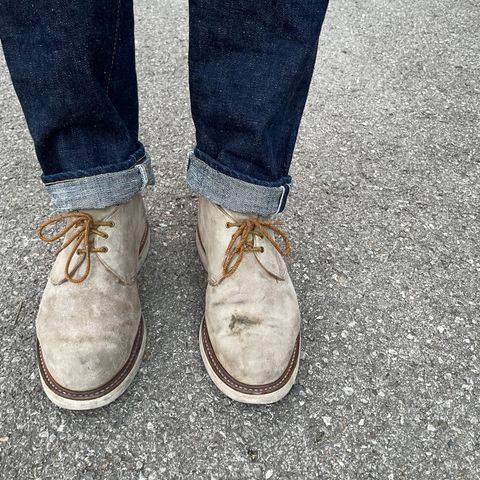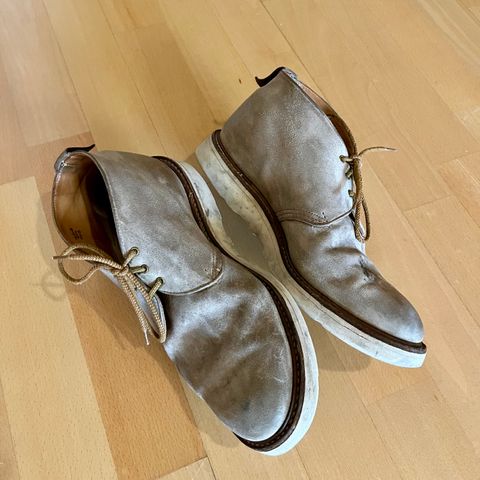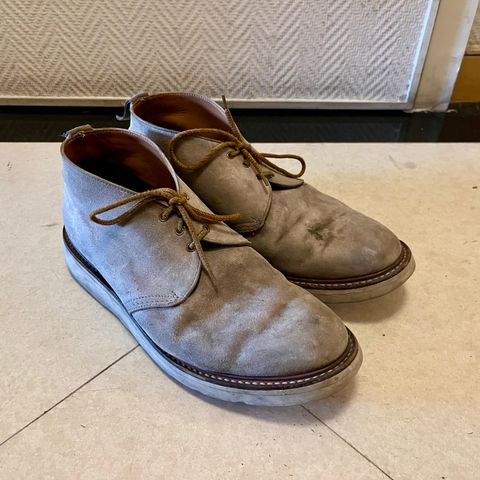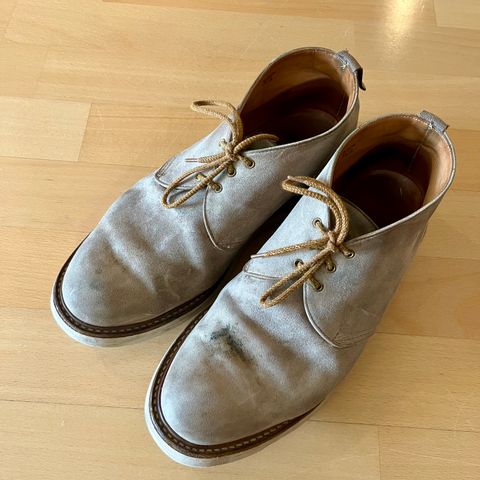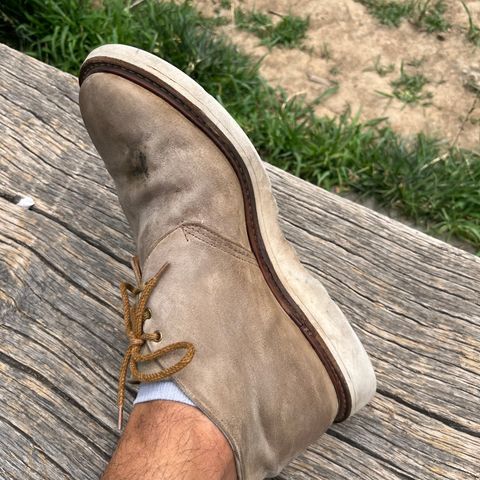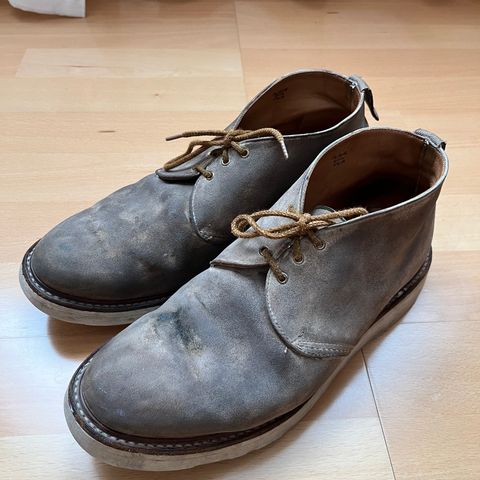About
C.F. Stead Peanut Kudu Reverse is a warm, creamy tan suede leather produced by Charles F. Stead, featuring the distinctive two-sided construction of the Kudu Reverse line. The material combines a soft suede reverse side with a nubuck grain side, both finished in the natural peanut colorway that showcases the leather's inherent character through subtle imperfections and natural markings. Known as the "cashmere of suedes," this leather delivers exceptional softness while maintaining the structural integrity characteristic of kudu antelope hides sourced from southern Africa.
About
C.F. Stead Peanut Kudu Reverse is a warm, creamy tan suede leather produced by Charles F. Stead, featuring the distinctive two-sided construction of the Kudu Reverse line. The material combines a soft suede reverse side with a nubuck grain side, both finished in the natural peanut colorway that showcases the leather's inherent character through subtle imperfections and natural markings. Known as the "cashmere of suedes," this leather delivers exceptional softness while maintaining the structural integrity characteristic of kudu antelope hides sourced from southern Africa.
The peanut colorway presents a versatile neutral tone that complements both casual and refined footwear applications. The leather's distinctive grain and natural marks create a unique appearance in each piece, with variations that reflect the wild origins of the kudu antelope. This color variant has become particularly prominent in heritage footwear, appearing in collections from brands including Tricker's and Berwick 1707.
Material Origin
Peanut Kudu Reverse originates from the hides of kudu antelope native to southern Africa. These wild animals produce leather with natural characteristics that distinguish it from domesticated livestock hides. The skins typically measure 13 to 15 square feet, with thickness ranging from 1.6 to 2.2 millimeters. The fiber structure of kudu hides proves particularly well-suited to specialized tanning processes that preserve both the material's natural softness and its inherent strength.
The wild nature of kudu means each hide carries unique marks from the animal's life in its natural habitat. These characteristics include scars, cuts, and natural grain variations that become prominent features rather than defects when processed as reverse suede. The peanut color treatment emphasizes these natural markings, allowing them to contribute to the leather's distinctive appearance.
Tanning Process
Charles F. Stead processes Peanut Kudu Reverse using their proprietary Janus tannage, a technique that creates the leather's characteristic two-sided construction. This specialized process develops the soft suede texture on the reverse side while finishing the grain side as a nubuck. The tannage maintains the fiber structure's natural qualities, resulting in leather that feels notably soft while retaining structural integrity.
The Janus tannage represents a technical approach that balances competing material properties. The process preserves the kudu hide's natural strength while achieving the luxurious softness that has earned the leather its "cashmere of suedes" designation. The peanut color application highlights rather than conceals the natural markings and grain patterns present in the hide, creating visual interest through the leather's inherent characteristics.
Physical Characteristics
The material presents two distinct surfaces with complementary properties. The reverse side features a uniform suede texture with a soft, buttery touch and a luxurious nap that delivers exceptional comfort. The grain side displays a nubuck finish that showcases the leather's natural history through visible scars, cuts, and grain variations highlighted by the processing technique.
The peanut colorway appears as a warm, creamy tan that provides a neutral foundation suitable for diverse footwear designs. This color brings out the natural marks and subtle imperfections in the leather, emphasizing the material's authentic character. The distinctive grain pattern and natural variations ensure that each piece develops a unique appearance, with no two sections of leather presenting identical markings.
Both surfaces demonstrate equal durability and water resistance despite their different textures. The tight fiber structure maintains the leather's protective qualities while allowing the soft touch that characterizes the material. This combination of properties makes the leather suitable for applications requiring both comfort and resilience.
Applications
Peanut Kudu Reverse appears prominently in heritage footwear collections, particularly in styles emphasizing traditional construction methods and natural materials. The leather proves especially suitable for stitch-down construction, where the casual appearance of the visible welt complements the material's inherent character. The peanut colorway's neutral tone allows it to serve as a versatile foundation for both casual and refined shoe designs.
Tricker's has featured Peanut Kudu Reverse across multiple styles within their African Explorer collection. The Woodstock derby combines the leather with a light crepe sole for a refined casual aesthetic. The Daniel walking shoe utilizes the material in a traditional British silhouette finished with a natural rubber crepe sole. The Bourton derby brogue presents the leather in a more formal context with traditional brogue detailing. The Ethan monkey boot demonstrates the leather's suitability for casual footwear, featuring a Vibram Morflex wedge sole.
Berwick 1707 has incorporated the leather into their Flex Walk ankle boot line, creating ultra-modern designs that emphasize comfort while showcasing the exceptional quality of the reverse suede. The combination of the leather's natural properties with contemporary construction techniques results in footwear that balances tradition with modern performance expectations.
Care and Maintenance
The suede surface requires regular attention with a soft suede brush to remove surface dirt and restore the nap. This simple maintenance routine helps preserve the leather's characteristic texture and appearance. The brushing action lifts the suede fibers, maintaining the material's soft touch and visual appeal.
Protection against water and stains becomes important given the suede's porous nature. Application of suede protector spray creates a barrier that helps prevent liquid absorption while maintaining the leather's breathability. This protective treatment should be reapplied periodically, particularly after cleaning or extended wear periods.
Storage conditions affect the leather's longevity and appearance. Direct sunlight exposure can cause fading of the peanut colorway, altering the leather's intended tone and potentially creating uneven coloration. Proper storage in a location away from sustained light exposure helps maintain the color's consistency over time.
For tougher stains that resist dry brushing, suede shampoo formulated specifically for delicate leathers provides a cleaning solution without damaging the material's structure. Following shampoo treatment, application of a sealer helps prevent future staining by creating a protective barrier on the suede surface. This maintenance cycle of cleaning, protection, and regular brushing helps preserve the leather's distinctive characteristics throughout extended use.
References
Tricker's Daniel - Peanut Kudu. Robinson's Shoes. Accessed October 2, 2025.
Tricker's Bourton Peanut Kudu Reverse Suede Derby Brogue Shoes. Woodhouse Clothing. Accessed October 2, 2025.
Kudu Reverse. Charles F Stead and Co Ltd. Accessed October 2, 2025.
Tricker's C.F. Stead Collection. Division Road, Inc. Accessed October 2, 2025.
Berwick 1707 Flex Walk Ankle Boot - Kudu Reverse Suede In Peanut. A Fine Pair of Shoes. Accessed October 2, 2025.
Tricker's Ethan Monkey Boots in Peanut Suede. Arthur Knight. Accessed October 2, 2025.
